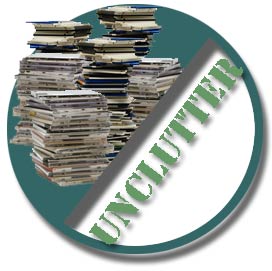De-clutter your way to spiritual growth
By CARYLE MURPHY, The Washington Post, Nov 25, 2004
North Potomac, Maryland -- Lia Kent, raised with what she calls a ?Depression mentality,? always found it hard to throw things away. Her North Potomac, Md., home was filled with clothes that no longer fit, piles of magazines she never read and gifts she never used. But a few years ago Kent began rising earlier than her four children and husband to have quiet time for spiritual reflection. And something clicked.
 ?I saw a house full of stuff. ... I saw my house and how cluttered it was,? Kent said. ?I just realized I had too much excess and that (it was) getting in the way.?
?I saw a house full of stuff. ... I saw my house and how cluttered it was,? Kent said. ?I just realized I had too much excess and that (it was) getting in the way.?
Kent threw out the hoarded magazines and gave away her old clothes. She ?worked on not acquiring so much,? she said, by no longer shopping at yard sales and by making major purchases only after first going home to deliberate about them.
?The catalyst for this was my faith,? said Kent, a Greek Orthodox Christian. ?My consumption of things was my greed, me wanting more than my fair share.?
Kent's experience illustrates what religious leaders and lifestyle experts describe as a growing appreciation by many Americans that an overabundance of material goods can be a drag on spiritual development. Increasingly, de-cluttering and downsizing are being viewed in a spiritual context, as ways to remove distractions to inner growth.
People ?are beginning to see that their possessions become a weight and a barrier to their spiritual life and to their happiness,? said the Rev. Elizabeth Braxton, pastor of Burke, Va., Presbyterian Church. They are realizing, she added, that ?the more we have, the more we have to take responsibility? for it and ?the less time we have for ... the breathing space of God.?
Clutter is also a secular problem, of course. It is still the domain of professional organizers, hired by people needing help to bring order to their lives. And for those who are truly addicted to holding onto things, there are 12-step support groups such as Clutterers Anonymous.
But the subject is of increasing importance to the spiritually minded, judging by numerous recent books and magazine articles, as well as a proliferation of Web sites that post people's ?spiritual journeys? to downsizing and offer workshops on ?the spirituality of clutter-free living.?
Feng shui, the ancient Chinese system for creating a harmonious environment that now widely influences home decorating, has become another spiritual voice warning against a surplus of material goods. ?The first rule of feng shui is no clutter,? writes Sarah Shurety in her book, Feng Shui for Your Home. Clutter, she explains, ?creates stagnation and makes everything grind to a halt, it makes you feel depressed, tired and stuck.?
Most faith traditions extol simplicity as a means to spiritual enlightenment.
In Roman Catholicism, austerity ? exemplified by monks and nuns in monasteries and convents ? was held up for centuries as a model. Buddhism emphasizes the relationship between external simplicity and internal insight. And in Judaism, the virtue of moderation is getting new attention, according to a newsletter put out by the Reconstructionist Movement. A recent article noted how some Orthodox rabbis, concerned about the desire of some Jews to ?keep up with the Goldbergs,? are refusing to officiate at weddings deemed overly sumptuous.
Kristin van Ogtrop, managing editor of Real Simple, a New York-based secular magazine that promotes simplicity as a lifestyle, said readers have made it clear that they experience inner rewards from uncluttering.
?They feel a greater sense of peace when ... they're not overwhelmed by their physical surroundings,? Van Ogtrop said.
A grass-roots national movement called Voluntary Simplicity is another example of how people are responding to spiritual concerns about material abundance. The movement has drawn in people who want to cut back on possessions and slow their pace of life. While many have joined because of environmental concerns, others are attracted by the spiritual benefits.
Michael and Christine Talbert discovered the spiritual benefits of downsizing by accident. After Christine Talbert, a Fairfax County, Va., teacher, accepted a one-year teaching assignment in South Korea, the Falls Church, Va., couple sold their four-bedroom home on five acres and put all their possessions into storage.
Overseas, they lived in a one-bedroom apartment and had no car ? an experience that made them converts to simpler living.
?It's not that my faith in any conscious way (brought) me to do this,? said Michael Talbert, a federal employee who attends Burke (Va.) Presbyterian Church. ?But by doing it, it opened up the opportunity to look in a clearer way at my faith. ... I'm just an ordinary guy who goes to church on Sunday and who believes that what I hear and see on Sunday should be reflected in the rest of your life. By having less stuff in your life, there's a better chance you'll be able to do that.?

 ?I saw a house full of stuff. ... I saw my house and how cluttered it was,? Kent said. ?I just realized I had too much excess and that (it was) getting in the way.?
?I saw a house full of stuff. ... I saw my house and how cluttered it was,? Kent said. ?I just realized I had too much excess and that (it was) getting in the way.?